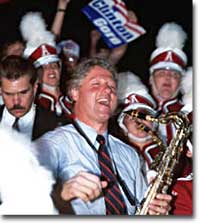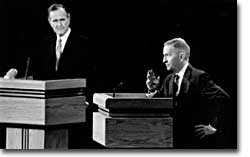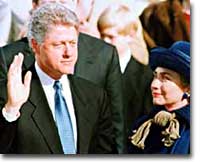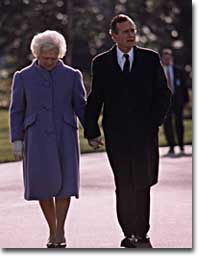60b. A Baby Boomer in the White House

Despite allegations of smoking marijuana, having extramarital affairs, and dodging the draft, Bill Clinton came out of his 1992 Presidential campaign victorious.
President Bush enjoyed an approval rating in March 1991 of 91 percent for his handling of Operation Desert Storm. As the Presidential race for 1992 began to unfold, many potential candidates were scared to challenge him and look to 1996 as a better opportunity. But the recession that battered the American economy would not go away. As growth remained low and unemployment persisted, some of the shine began to wear off the President. Not since James Monroe's
second term in 1820 had a sitting President been re-elected during an economic slump.
Enter Bill Clinton.

In the October, 1992 Presidential debate at Michigan State University, Ross Perot charmed America with his no-nonsense wit: "I love the fact that people will listen to a guy with a bad accent and a poor presentation manner talking about flip charts for 30 minutes, because they want the details. See, all the folks up there at the top said the attention span of the American people is no more than five minutes, they won't watch it. They're thirsty for it."
The two candidates could hardly have been more different. Bush was a hero of World War II and had extensive Washington experience, including heading the CIA, Ambassador to the United Nations, and eight years as Vice-President.
Clinton was born after World War II and did not fight in Vietnam, so he faced constant charges of dodging the draft. He had no experience on the federal level of government; he simply was the popular governor of Arkansas. Throughout the campaign, scandal after scandal hit Clinton. Charges of adultery were addressed on television. When accused of smoking marijuana in the 1960s, Clinton confessed — but added that he did not inhale. Rumors of a real estate scandal called Whitewater surfaced from time to time. Clinton was no "Teflon" candidate. Everything stuck to him, but none of it mattered in the end.
His campaign adviser posted a sign over his desk that read simply: "It's the economy, stupid." With a charismatic smile and a gentle, sincere voice, Clinton hammered away at the recession, and promised new ideas and a break with twelve years of Republicans in the White House.

Bill Clinton was the first President since Richard Nixon to win the White House with less than 50% of the popular vote.
Additional problems beset President Bush in 1992. In April, the city of Los Angeles erupted into a five day looting and burning rampage that killed more than 50 people and claimed damages nearing $1 billion. The riot was touched off by the acquittal of five Los Angeles police officers for the beating of Rodney King during his arrest in 1991. A hidden camera showed the officers repeatedly beating King with nightsticks while he lay on the ground. Despite the video evidence, the jury found the police officers not guilty of using excessive force. The announcement of the verdict released years of pent-up rage many African Americans felt about the ongoing problem of police brutality.
Bush faced a challenge for his own party's nomination by Patrick Buchanan, a journalist and former Nixon aide. Buchanan voiced concern about immigration, free trade, abortion, and appealed to the social conservatives in the Republican Party. Although the President defeated Buchanan handily in the primaries, he was forced to spend resources in the effort.

President George Bush and First Lady Barbara Bush on their last day at the White House.
The most successful third party candidate since 1912 emerged in the form of Ross Perot, a Texas billionaire. Perot brought the problem of the nation's growing national debt to the campaign. Millions watched his self-funded 30-minute primetime campaign commercials that attacked both Republicans and Democrats for reckless spending and immense deficits.
Election Day belonged to Bill Clinton. Although he garnered only 43% of the popular vote, he beat President Bush handily in the electoral tally. Bush earned 38% of the vote, and Perot reached an impressive 19% of American voters. Much of Clinton's support came from baby boomers. Clinton's victory marked an end to the domination of politics by the World War II generation. Americans who had come of age during the turbulent sixties and seventies now had a representative in the White House.






